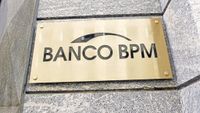On March 26, 2025, shares of Banco BPM plummeted in the stock market following a negative opinion from the European Central Bank (ECB) regarding the application of the "Danish Compromise" related to the bank's takeover bid (OPA) for Anima. The ECB's stance, which financial sources suggest is rooted in differing interpretations of the Capital Requirements Regulation (CRR), has significant implications not only for Banco BPM's offer but also for Unicredit's concurrent exchange offer for Banco BPM.
The Danish Compromise, an accounting rule established in 2012, incentivizes acquisitions made by banks through their insurance subsidiaries. However, the ECB has expressed opposition to an extended interpretation of this rule, which is crucial for the success of Banco BPM's bid for Anima. As a result, Banco BPM's shares fell by 5.53%, landing at the bottom of the FTSE MIB index, while Unicredit's shares dropped by 0.83%. Anima Holding also saw a slight decrease of 0.29%.
The ECB's negative opinion does not constitute a formal decision; rather, it leaves the final word to the European Banking Authority (EBA). Banco BPM has submitted a specific inquiry to the EBA, seeking confirmation on whether the Danish Compromise can be applied to the Anima acquisition. In a note, Banco BPM emphasized that the ECB's position is not a definitive ruling and that discussions with the ECB are ongoing.
In light of the ECB's opinion, Banco BPM has convened a Board of Directors meeting for March 27, coinciding with Unicredit's assembly. Unicredit had previously hinted at the possibility of withdrawing its offer for Banco BPM, contingent upon regulatory approval. The uncertainty surrounding the Danish Compromise could complicate the ongoing negotiations and lead to significant changes in the banking landscape.
As of March 25, 2025, Banco BPM reported that it had secured 47.24% of Anima's share capital, surpassing the minimum threshold of 45% plus one share required for the takeover bid. The bank noted that it is close to exceeding 50% of Anima's capital, which would strengthen its position in the acquisition.
The implications of the ECB's decision extend beyond Banco BPM. Should the EBA uphold the ECB's opinion, the acquisition of Anima could become substantially more expensive, potentially prompting Unicredit to reconsider its bid of over 10 billion euros for Banco BPM. Unicredit's CEO, Andrea Orcel, has previously expressed concerns about the potential dilution of investment returns without the Danish Compromise, stating that the transaction would yield a return on investment of over 15% with the compromise but only 11% without it.
Banco BPM's management has attempted to reassure investors, highlighting that the potential effects of a negative ruling from the EBA have been factored into their strategic planning. The bank's 2024-2027 strategic plan anticipates maintaining a Common Equity Tier 1 (CET1) ratio above 13%, compared to a higher 14.4% if the Danish Compromise is approved. The overall target for shareholder distribution is set at 6 billion euros, which is significantly higher than previous plans.
In the wake of these developments, the Italian banking sector is facing a tumultuous period, with the potential for significant shifts depending on the EBA's forthcoming decision. The market is already reacting to the uncertainty, with Banco BPM's stock values reflecting the ongoing negotiations and the evolving landscape of the banking sector.
As the situation unfolds, analysts and investors alike will be closely monitoring the outcomes of the board meetings and the EBA's ruling. The stakes are high, and the consequences of these decisions will reverberate throughout the Italian banking system.





